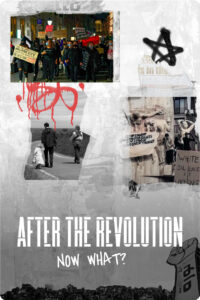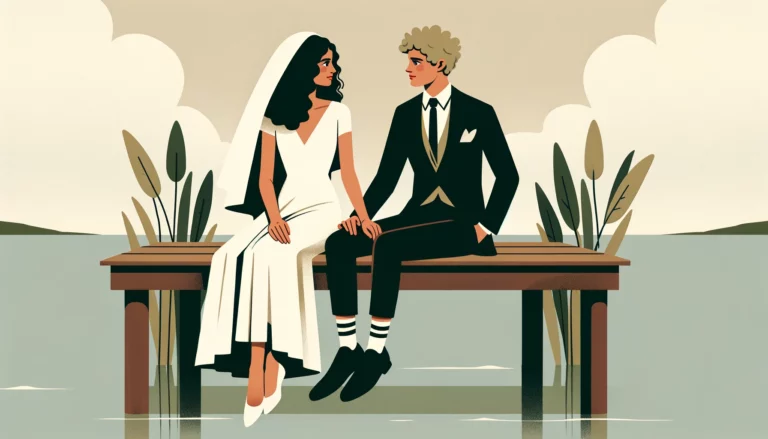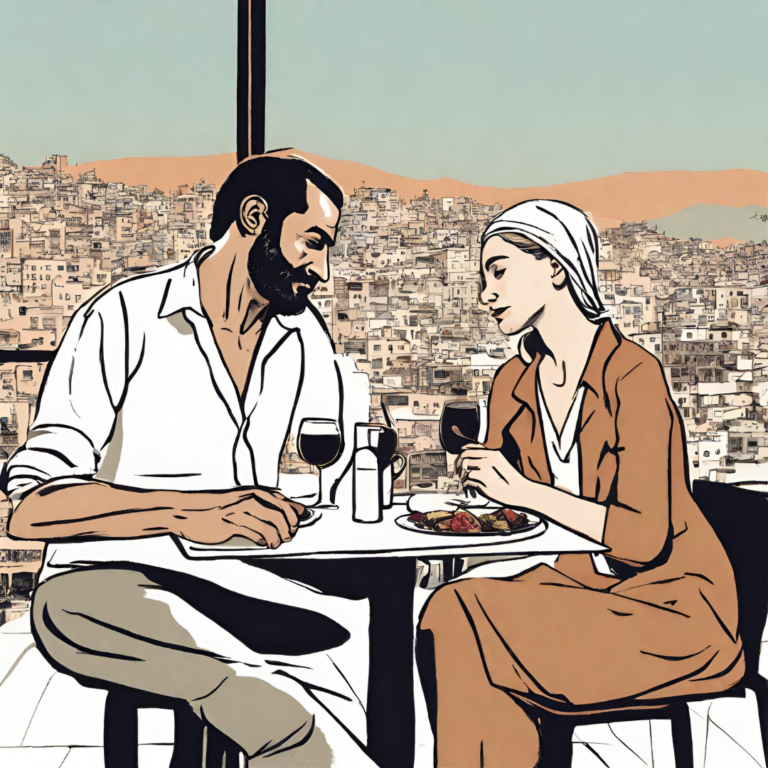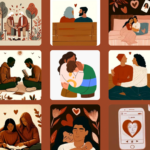When you’re a little girl in Lebanon, there is always that annoying someone who is ready to single you out by wishing your parents: “A’bela!”. It’s a customary greeting. They hope to attend the young girl’s wedding soon, and wish for it to be prosperous and beneficial. That’s the way things are done, these are the things that they say, there’s no need to go on and on about it. My mother doesn’t care much for this custom. Don’t wish this misfortune on her daughter: “No! I hope she doesn’t marry! Marriage is nothing but trouble! Wish her a good education and career!” The person in front of her, embarrassed and not wanting to engage in this kind of conversation, has no choice but to turn and retreat: “Well, I hope we see her with fancy diplomas then!” Sometimes, a naive adversary will dare to object, “Why not marry? She can do both things…” This challenger will find my mother ready to fight, her rhetorical weapons already sharpened. “I don’t see how a woman can blossom within a marriage.”
My mother doesn’t need to make a significant effort to keep me away from this hated institution. It’s not just the failure of my own parents’ couple that made up my mind, it’s also the happy marriages. Everywhere, aunts and friends’ mothers bend over backwards to serve some paunchy grump, who demands he be brought properly ground coffee, tabbouleh without tomatoes; that his socks be brought to him still warm from the radiator, and that others keep quiet so he may sleep, all while they ignore his eccentric behavior. The only concern these women have is that their husband be kept happy. My mother had refused this life of submission. Divorce was the price she paid for her impetuousness.
Of all the dangers my mother faced when filing for divorce, the risk of losing her daughters was the hardest to bear. Did she ever talk to me about this risk, specifically? Did she ever tell me about the terrible sessions had in the ecclesiastical family court? I don’t remember. I was only a child – and she was a good mother, the type who read Child Psychology textbooks. Yes, she was a good mother, in spite of her suits, her schedule, her job at the university, in spite of what the priests, the great aunts, and her late mother-in-law said about her; she was a good mother, in spite of the danger she kept from me. Go tell a nine-year-old whose mouth only knows the word “Mommy” that she is at risk of being torn away from her mother, because, according to Beirut’s Greek Orthodox Archdiocese religious courts, children over the age of seven must be returned to their fathers post-divorce. Seven years: Plenty of time for a mother to fulfill her nurturing duties. And then after that, they’re off to their father’s kingdom.
How can there be, rooted within the breast of such a brutal world, the possibility of love? I think there is a transcendent part which escapes analysis
Anything, but having to lose her daughter. She endured an unhappy marriage with heroism. Strong women do not flinch away from the fate they have chosen, no matter how terrible it may be, my mother says to herself over and over again. Had she flinched, it would have been in vain. In Lebanon, there is nothing to provide help: laws, police, family, no one meddles in others’ private affairs. This being her fate, she walked towards him with great fanfare. I have rarely seen photographs of her wedding. In them she is smiling, under a white crown and veil, bound with satin and lace, ready to be delivered to this tall man whose features are, still today, practically unknown to me. The ridiculousness of the 80s-style puffed sleeves (“Don’t laugh, Lady Di wore the same”) barely softens the sadness in her eyes.
Eleven years after her wedding, she no longer recognizes herself. She, who was once so expressive and insolent, has now withered. She is cautious, fearful, docile. In later years, she explained this withering by speaking this metaphor: “Marriage, it clipped my wings.” Marriage is torment, but divorce is a martyrdom that bears fruit. It was worth it, to go and suffer before the Greek-Orthodox priests of the religious court of domestic affairs: she was granted a divorce, and in spite of the written laws, was also given custody of me. Her stubbornness paid off. Or, it was the disinterest of her ex-husband, who was unwilling to be burdened by caring for a minor. It doesn’t matter. At long last, now a single mother, she bleaches her hair, and trades her austere suits for short and colorful dresses. The early 2000s offer plenty with which 40-somethings can water their imaginary love. At the movies, beautiful American women of her age find romance in the arms of Hugh Grant or Richard Gere. Granted, the recent divorces of these Western heroines weren’t as grueling as hers. American women have no cassocks threatening to take their children away. There is no stigma for being a divorcee, only loneliness. No matter, my mother sees herself on screen. She listens to Gloria Gaynor’s I Will Survive over and over again, dances in the middle of the living room, and finds salvation in this turn of the millennium feminism which treats a breakup as an opportunity for rebirth, and a woman’s economic success as the first step of her emancipation. I grew up among her personal development and self-help books, all promising an exciting life, without men.
Sometimes I wonder why other young girls around me never thought to question the matrimonial arrangements that, frankly, put them at a disadvantage. They would dream of white dresses and of “leaving their father’s house honorably.” Marriage, I came to understand, is much more than the union of two individuals. Through it, women gain a new status. They escape the absolute minority that is childhood, and join, as wives, a more significant minority. And while the empire they control is limited, it’s one that offers them many opportunities to exercise their authority. There will be a home, to the dimensions of their husband’s wealth, children, cars, perhaps a maid. So, they are willing to forgo a bit of freedom.
Sitting in the pews at church, there were many times when I had to remain silent while a priest spoke to a girl all wrapped in a white petticoat, and to those in the audience: “Wives, submit to your husbands, as you do to the Lord; for the husband is the head of the wife, as Christ is the head of the Church, his body, of which he is the Savior. Now, as the Church submits to Christ, wives too must submit to their husbands in all things…” After the celebration, we would pose, one by one, next to the bride, a walking curiosity who was as happy as a monument being exchanged between two nations. There were times I would smile for the photos, of course, but I was already devoted to something else. Something that was the opposite of these religious, bourgeois, inegalitarian marriages, which form the primary cells of the social tissue of my country of origin. So what, then, is the opposite of marriage?
I didn’t really know what I was looking for, but knew where to look. I had to leave. I would be released from the customs that weigh women down with useless constraints. I would finally be free, available to sex, to love, to passion, to adventure (because isn’t that the opposite of marriage: adventure?). As a teenager, I had watched Sex and the City and read Belle du Seigneur more religiously than I had read the Gospel. Every aspect of love was covered by these two extremes; opposites, but equally alluring. On one side, the frivolity of conquests, men and easy uncomplicated love, as easy to choose from as Ken dolls on the shelf: there is the simple and big country handsome guy, the sophisticated businessman, the tortured writer. On the other side is frantic passion, a terrifyingly beautiful Solal of the Solals, the one who will hold your hand until death. I didn’t know which of these fates awaited me, whether I was Ariane who commits suicide, or Carrie who relies on lavish amounts of pumps and cocktails to console herself through breakups. But I couldn’t wait to find out. I was being called to the loneliness of the great cities of the West. Only they would know how to reveal me to myself, how to make me the heroine that I had to become. It would only be possible by leaving the small and narrow world I had known, the life that was planned for me but imposed on my mother.
I will not dwell on the happiness and disappointments of those formative years. In any case, they resulted in two indisputable observations. The first is absolutely obvious today, thanks to the work of contemporary feminists who have meticulously analyzed heterosexual couples. The oppressions I was trying to escape in my country have not vanished with the advent of more women-friendly legislation. They have found a way to mutate, and countless vestiges of them remain in every couple we form with men, like a miserable script that can never be unlearned. We are to make ourselves beautiful, smile, go about our business, and make ourselves available, forever and ever. There is no land far enough away to which we can flee.
But with Luca, I discovered that it is possible to be part of a family as an equal, without submitting. To preserve this radical allegiance, which protects from vicissitudes, a passionate and above all mutual commitment is required
The second observation came to me from the immense sorrow that at times manifests itself when I am with others. Deep in my innermost thoughts is the fear of being completely replaceable. And a chasm forms in my chest when I check my phone’s screen, and see that no one has thought to write me. And the last fear arises when the night becomes dark, and I am lonely and without help. It’s the feeling of having to fight for what should be rightfully mine, like love or respect, or a sense of community. It turns out that I was suffering from a common malady, one that equally affects all members of my generation. The feeling is so prevalent that it is now commonplace to condemn modern solitude and the inability to create what is called “true connections,” to break our solitude. We foolishly blame technology, even though it is only partly responsible for the current state of things. We owe this individualism entirely to the expansion of the neoliberal struggle for a private sphere. We all have a price on the social and love markets, and we spend our lives in negotiations, wanting to cut the best deal. I was already exhausted by this endless bargaining. I had often dreamt of these joyful and easy transactions. It seems to me now that I had used up all their jubilation. Are we condemned to choose between the traditional frameworks that suffocate us or the degradation of neoliberal modernity? These big cities where anyone can die alone in the street? Between the two, I came close to believing in the impossibility of happiness.
It was in the middle of this desolate landscape that I met Luca. I immediately felt like I was up against a fortress, and wanted to believe, without reservation, in his sturdiness. Luca is a man who has the strength needed to oppose the world, that is to say, the competition we all participate in, in spite of ourselves, and want to win. He never lets himself be drawn into a corner. He has seemingly always had a clear understanding of his position amongst others: I think this is what makes Luca a truly good man. The existence of kindness is something that cannot really be explained. It is a phenomenon that emerges from the void. In this same way, I can’t quite explain my first meeting with Luca. I don’t know how it is possible for two people to begin a new conversation. How is it possible to forget the posturing, the control, the violence, the traps, and to find yourself free of a power struggle relationship. I cannot say why our match avoids these dynamics. How can there be, rooted within the breast of such a brutal world, the possibility of love? I think there is a transcendent part which escapes analysis. It simply is. I won’t go into pointless explanations and I won’t pretend to give others instructions on how they can make it happen for themselves.
Love is made of seemingly insignificant things. Of shared rituals, tiny gestures, of sleep and food. Yet, when these tiny phenomena are combined, something emerges which transcends them. It is as if a new breach has opened, and there is a new way of existing in the world we had previously given little regard. And then it appears, by virtue of companionship, the bond which is woven from days spent together becomes the most important thing of all. It gives life value and makes death unfortunate. Women’s conditions have been so terrible that we believed renouncing the strength of these bonds was the only way to free ourselves from imposed submissions. We believed that we had to deny ourselves families, the indivisible cell which was the source of so many oppressions. That had been my plan. But with Luca, I discovered that it is possible to be part of a family as an equal, without submitting. To preserve this radical allegiance, which protects from vicissitudes, a passionate and above all mutual commitment is required. We have within our reach the possibility of being together, our humanity fully recognized. We have the possibility of embodying love. But in order to do so, we must rebel against the culture of continuous optimization. There is a certain amount of self-assurance required to say, “This is it, this will be him, forever, come sickness, wars, ruin, other men, I will always be there, by his side, that is where I will return.” And in fifty years it will be wonderful, having spent all this life together. What is this promise called, until death do us part? I think we call it marriage. It has the power to pull us away from the market of social and romantic relationships. Marriage cannot be reduced to its contractual terms. It is the renouncing of all contractual transactions. It is the solemn declaration that the casual agreements we can make with each other are not enough. It commits us to love without ever again evaluating its benefits and costs. Even atheists need to act on faith at times, to completely give themselves to what they believe in. For me, it is literature. It would appear that marriage is of this magnitude.
Help us tell the world to you !
Frictions is launching its club : by supporting Frictions, you’ll be supporting a community of authors and journalists who tell the world through intimate stories!

Ever since I became engaged to Luca, my mother has been excited by the preparations. She knows I am marrying a good man, but sometimes she is overcome with outdated fears, “Be careful all the same, maintain your independence.” I tell her that the rules governing my marriage are nothing like those that applied to hers. There are laws, we are in France, it is a secular marriage, I am my husband’s equal. But the thought that I’m playing a dangerous game won’t leave her mind. And yet, in the wedding dress store, she cried with joy. She wants me to wear a veil, a crown, a dress “that will make me look like a princess.” I don’t really know why I chose such a white dress, what urge there was, me, who never dreamed of marriage or its flourishes. But seeing my reflection makes me happy. I spin around in place a few times, like a little girl having fun with her petticoats. I think that my mother is happy too. Maybe we both needed this, maybe my pretty dress is healing old wounds. Maybe we need to reclaim the institutions that have made us suffer in order to repair the injustices, take back the tools of past oppression, and turn them back on their heads. What do we have in common, me, getting married today, and my mother, thirty-five years ago? Not much, I hope (at least not Lady Di’s puffy sleeves). We are living opposite experiences. Yes, this marriage is the opposite of their marriages.








